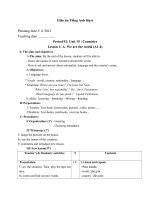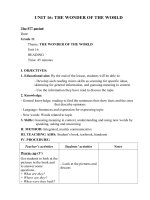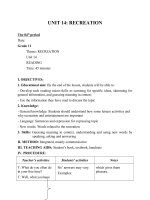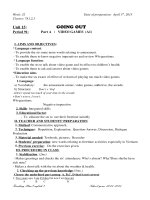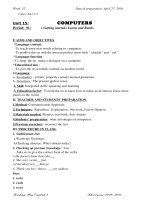Giáo án tiếng Anh 11 unit 15
Bạn đang xem bản rút gọn của tài liệu. Xem và tải ngay bản đầy đủ của tài liệu tại đây (156.8 KB, 23 trang )
UNIT 15: SPACE CONQUEST
The 91st period
Date:
Grade 11
Theme: SPACE CONQUEST
Unit 15
READING
Time: 45 minutes
I. Objectives:
1. Educational aim: By the end of this lesson, students will be able to:
- Develop such reading micro-skills as scanning for specific
ideas, and identifying and correcting false statements
- Use the information they have read to discuss celebrations
in their culture
2. Knowledge:
- General knowledge: sts can have a general idea of the lesson as well as enrich
their knowledge in the field of space and spacecraft; how human conquered the
space.
- New words: words/ phrases related to space and spacecraft
3. Skills: Reading for general or specific information
II. Method: Intergrated, mainly communicative
III. Teaching aids: Some photos of celebrations in the world
IV. Procedures:
Teacher’s activities
Warmer
(Teacher prepares a
picture of a plane, a
spacecraft and an
astronaut)
Students’ activities
Discuss in pairs and
answer the teacher’s
questions
Suggested answers:
Notes
→ T asks students to look - It’s a plane/ a spacecraft/
at the pictures and answer an astronaut.
the questions:
- A person who flies a
plane is called a pilot, and
- What can you see in
a person who flies a
each picture?
spacecraft is called an
- What do you call a
person who flies a plane/ astronaut.
a spaceship?
- Which job do you
prefer, a pilot or an
astronaut? Why?
(Based on sts’ answer,
teacher leads in the new
lesson)
Pre- Reading
Activity 1:
- Ask sts to match the
names with the pictures in
the textbook. (page 166)
Answer orally
(Order of the pictures
from left to right: Neil
Armstrong, Yuri
Alekseyevich Gagarin,
Pham Tuan)
1. Pham Tuan
2. Neil Armstrong
3. Yuri Alekseyevich
Gagarin
Activity 2:
- Have sts work in pairs,
answers the questions in
the textbook based on the
names of people in
activity 1.
- Check sts’ answer and
supply the correct
information if necessary.
Activity 3:
Answers to the questions
in textbook:
1. Yuri Alekseyevich
Gagarin
2. Neil Armstrong and
Buzz Aldrin
3. Pham Tuan
- Listen and take notes
- Teacher introduces some
new words
orbit (n)
weightlessness (n)
enormous (a)
uncertainty (n)
temperature (n)
occur (v)
- T has sts practise
reading the new words
While-Reading
Task 1:
Sts open books, listen to
the text and read in
silence.
- Give instructions for
task 1.
- Read aloud their
answers.
- Ask sts to read the
passage silently to finish
task 1.
Suggested answers:
T plays the cassette
- Check orally & correct
if necessary.
Paragraph 1: B the lift off
Paragraph 2: D A view on
Earth
Paragraph 3: E
Uncertainties
Paragraph 4: C
Congratulations
Paragraph 5: A The tragic
accident
Task 2:
- Ask sts to read the
passage again to answer
the question in pairs.
Read silently and then
work in pairs.
Give answers and take
- Teacher walks around to notes.
give help if necessary.
Suggested answers:
- Check sts’ answers by
asking some pairs of sts
give the questions and
answers
1. He was 27 then.
2. He was in space for
108 minutes.
3. They were what would
happen to a human being
in space or how the body
would react to the
extreme changes in
temperature or how the
mind would deal with the
psychological tension.
4. It was more than 17
000 miles per hour.
5. Because he died in a
plane crash on a routine
training flight in March
1968.
6. After his death, his
hometown of Gzhatsk
was renamed Gagarin,
and the Cosmonaut
Training Center at Star
City, Russia, was given
the name of this national
hero.
7. In space Work in
groups and do the task.
Give answers
Suggested answers:
1. cosmonaut
2. lasted
Post-Reading
3. success
Ask sts to work in groups,
complete the summary of
4. gravity
the reading passage by
putting the words/ phrases
in the box into the blanks
- Teacher walks around to
give help if necessary
5. view
6. impossible
7. named after
- Check sts’ answers and
give bonus to the winners. Learn the new words
HOMEWORK:
Read the passage again
- Learn the new words
- Read the passage again
- Prepare Part B:
Speaking
Prepare Part B: Speaking
The 92nd Period
Date:
Grade 11
Theme: SPACE CONQUEST
Unit 15
SPEAKING
Time: 45 minutes
I. OBJECTIVES:
1. Educational aim: By the end of the lesson, students will be able to talk about
possible of events.
- Talk about historical events on the space conquest.
2. Knowledge:
- General knowledge: Students know how to talk about possible of events. talk
about historical events on the space conquest
- Language: making a conversation of a famous person
New words: Words/phrases relate to the process of launching its first manned
apace craft into space.
3. Skills: Speaking to describe appearances
II. Method: Integrated, mainly communicative
III. Teaching aids: Textbook, picture of the parts of the body
IV. Procedure:
Teacher’s activities
Warn Up (5’)
Students’ activities
Listen
close the book
- Give some picture of
famous astronaut
- Ask sts some questions
and answer
Answer
Notes
Question
1. Who Are They?
2. What Are They?
3. What Are their
nationalities?
* Ask sts rearrange 6
picture with is name
Pict 1: He’s Pham Tuan VietNamese astronaut
2. He’s Yuri Gagarin
Russian astronaut
3. Buzz Aldrin American Astronaut.
4. Yang Liwei - Chinese
Austronaut
Pict 1: He’s Pham Tuan VietNamese astronaut
2. He’s Yuri Gagarin
Russian astronaut
3. Buzz Aldrin American Astronaut.
4. Yang Liwei - Chinese
Austronaut
5. John Glenn - An
American Astronaut
6. Valentina - Tereshkova
5. John Glenn - An
American Astronaut
6. Valentina - Tereshkova
Pre Speaking (8’) (task
1)
Now we study “Speaking
of Space conquest “.
Listen and repeat
- Has sts work in pair,
read the following piece
of news, then ask and
answer question (task 1).
Ex:
- Give some new words:
manned, spacecraft.
launch (v)
milestone
Work in pair
S1: When did China laugh
first manned spacecraft
into space?
S2: On October 15/2003
S1: What is the name of
china’s first manned
spacecraft?
- Has sts made questions
with when, what, how
old, how important, how
many.
S2: It’s SjemZjou
S1: What is the name of
the astronaut?
S2: His name’s Yang
Liuri
S1: How old was he when
he flow into space?
S2: 38 years old.
S1: How important was
the successful flight to
China
S2: Make a milestone in
China’s space project
While speaking (22’)
- Has sts talk about the
important events in space
exploration
- Walks around the class,
offer ideas and comments
when sts need help.
- Set model with students
Ex:
(1) T: when did Russia
launching its artificial
satellite?
1.S: on October 4,1957
T: What is the name of
Russia’s first artificial.
2.S: sputnik
T How important?
Post speaking (8’)
3.S: mask the beginning
of space age.
Has some students come
form of the class and talk
about the important event
in the space conquest.
individual
Homework (2’)
Prepare “listening”
Prepare “listening”
- Rewrite “the important
event in the space
conquest.”
- Rewrite “the important
event in the space
conquest.”
The 93rd period
Date:
Grade 11
Theme: SPACE CONQUEST
Unit 15
LISTENING
Time: 45 minutes
I. Objectives:
1. Educational aim: By the end of this lesson, students will be able to develop
such listening micro- skills as listening for specific
information and taking notes while listening
2. Knowledge:
- General knowledge: To help Ss practice listening about the 1st human moon
landing.
- To relate the content with real life.
- Language: Use past simple
- New words: Words related to memorable experiences
3. Skills: Listening for specific information and comprehension questions
II. Method: Intergrated, mainly communicative
III. Teaching aid: Pictures, chalk, cassette tape
IV. Procedures:
Teacher’s activities
* Warm- up:
Have students close their
books then ask some
questions to lead in
1. Name the 1st men to
Students’ activities
- Close their book.
- Answer the questions in
group.
1. Neil Armstrong & Buzz
Aldrin.
Notes
land on the moon.
2. American.
2. His nationality.
3. 20 July 1989
3. When
* Before you listen
- Work in pairs.
- Share as.
- Have students work in
pairs to match the picture
with the caption.
- Have students read a
loud the words correct.
1d – 2a – 3c – 4e – 5b
- Practice reading.
- Take notes
- Supply the stress (or
pronunciation) and the
meaning
* While you listen:
Task 1
- Explain the situation.
- Have students read
through the statements
quickly.
- Supply the meaning of
some words (in need).
- Listen.
- Read the statements.
- Take notes.
- Listen twice.
- Give answer after 3rd
times
- Play the tape thrice, for
the last time, have a pause 1F – 2F – 3F – 4F – 5T
after each sentence.
- Play the tape again (in
need) to confirm the
answer.
Task 2
- Ask students have a look
at the questions.
- Listen again.
- Have students listen to
the tape again for 3 times
- Read the questions.
(with a pause
- Listen to the tape.
- Work in groups to give
answers.
- Share answers & take
notes.
1. NASA’s Apollo
Program.
2. On 16 July 1969.
3. Controlling the oxygen
* After you listen:
- Work in groups.
- Have students work in
group to discuss the
questions.
- Go round the class to
help students (In need)
- Call some students to
give answer
- Ask some difficult
words.
- Share answer & take
notes.
1. Some reason:
- adventure
- find out another life
outside the earth
- precious material
Homework
- other place for human
beings.
Prepare Unit 15 –
Language focus
2. The three things are:
ise answer
- camera.
- water / food.
- tent.
Prepare Unit 15 –
Language focusise answer
The 94th period
Date:
Grade 11
Theme: SPACE CONQUEST
Unit 15
WRITING
Time: 45 minutes
I. Objectives:
1. Educational aim: By the end of this lesson, Students can get to know the
content and structure of one’s person biography.
- Students can write the biography of one identified person, based on the given
information.
2. Knowledge:
- General knowledge: Students learn about the content and structure of a biography
of a person.
- Language: The Simple Past Tense and Simple Present Tense
3. Skills: Writing a biography
II. Method: Interagrated, mainly communicative
III. Teaching aids: Chalk, textbook
IV. Procedures:
Teacher’s activities
Students’ activities
Warm up (3 minutes)
Show a short video clip
/picture about Neil
Armstrong and ask
students some questions
about him:
- Work in groups of four
- Who is he?
+ He is American
- What does he do?
+ In 1969
- Suggested answers:
+ He is Neil Armstrong
+ He is an astronaut
Notes
- Is he Russian or
American?
- When did he walk on the
moon?
Pre-writing (12 minutes)
- Divide sts into four
groups, ask one from each
group to the board to write
down information we
need to write one’s
biography. Others in the
same group can help by
shouting the needed words
or phrases.
- Give feedback and
marks to the group with
correct information.
Work in groups
- Brainstorming for
needed words/phrases to
write one’s biography
- Suggested answers: job,
address, hometown,
career, place of birth, date
of birth, quote, marital
status, family,
education…
- Choose five
words/phrases and explain
the meanings (if
necessary): career, place
of birth, date of birth,
quote,
Whilewriting
(20minutes)
- Work individually, then
check with their partners.
Task 1:
- Take notes on difficult
words.
- Ask sts to read the
information about Neil
Armstrong, the first
human to set foot on the
moon, then put each of the
headings in the box in the
appropriate blank.
- Show some pictures
relating to the career of
Neil Armstrong: NASA,
- Suggested answers:
1. Birth
2. Place of Birth
3. Known as
4. Career
5. Quote
the moon, space shuttle,
United States Navy.
- Explain the meaning of
some difficult words:
resign, appoint, vice
chairman, committee,
investigate, disaster, leap)
TASK 2
- Students works in
groups and write the
biography on a piece of
paper card
- Suggested answers:
Neil Armstrong is an
- Teacher divides students American astronaut. He is
into groups of four.
known as the first person
- Asks sts to write a
to walk on the moon. He
biography of Neil
was born on August 5th,
Armstrong from the
1930 in Wapakoneta in
information given in task Ohio. From 1949 to 1952,
1
he worked as a pilot in the
United States Navy.
- Ask sts to pay attention
Armstrong received his
to these points:
B.S from Purdue
+ prepositions: at-on-inUniversity in 1955. He
from-to-with
joined the NASA
+ Articles: a-an-the
astronaut program in
+ Words/phrases used to
1962. Neil Armstrong
write biography: be
became the first human to
known as- work as- resign step on the moon’s
fromsurface on July 20th, 1969.
+ Simple past tense
He was joined by Buzz
+ Simple present tense
Aldrin forty minutes later.
Armstrong and Aldrin
- Move around to
spent two and a haft hour
supervise and give help
on the moon’s surface.
when necessary
Armstrong received his
Post writing (10
M.S from the University
minutes)
of Southern California.
- Ask sts to exchange
He resigned from NASA
their paper card to correct a year later and from 1971
to 1979, he taught at the
- Ask one group to show
their biography on the
board.
- Give comment and
correct in front of other
students, ask them to pay
attention to some basic
grammatical mistakes
University of Cincinnati.
In 1986 Armstrong was
appointed vice chairman
of the committee that
investigated the
Challenger shuttle
disaster. He is also wellknown for what he said
when he stepped on the
moon’s surface:” That’s
one small step for man,
one giant leap for
mankind”
- Students pick out the
mistakes then correct
them.
- Show their biography on
the board
Homework
Ask sts to write their own
biography
Write their own
biography
The 95th period
Date:
Grade 11
Theme: SPACE CONQUEST
Unit 15
LANGUAGE FOCUS
Time: 45 minutes
I. Objectives:
1. Educational aim: By the end of the lesson, students will be able to:
- Distinguish the sounds /nt /, /nd/ /nθ /, /ns/ and /nz/
- Pronounce the words and sentences containing these sounds correctly
- How to use could/be able to and tag questions
2. Knowledge:
- General knowledge: Students know how to distinguish sounds nt /, /nd/ /nθ /,
/ns/ and /nz/and use some structures with or without “to”
infinitive
- New words: Words related to pronunciation nt /, /nd/ /nθ /, /ns/ and /nz/
3. Skills: Pronounce the sound nt /, /nd/ /nθ /, /ns/ and /nz/ correctly
II. Method: Intergrated, mainly communicative
III. Teaching aids: Student’s book, textbook
IV. Procedure:
Teacher’s activities
Pronunciation: (15
minutes)
- Has students listen and
repeat the sounds nt /,
/nd/ /nθ /, /ns/ and /nz
- Asks students to practice
reading the sentences
Students’ activities
- Listen to the tape
carefully
- Practise reading
Notes
provided
Grammar and
vocabulary: (28 minutes)
Could, was/were able to
1.1. Could:
Ex1: My grandfather was
very clever. He could speak
five languages.
Ex2: We were totally free.
We could do whatever we
wanted.
1.2. Was/were able to:
Ex: A girl fell into the river,
but fortunately we were
able to rescue her.
COULD NOT or
WAS/WERE NOT ABLE
TO.
Ex: My father couldn’t
swim. (My father wasn’t
able to swim)
COULD: khả năng nói
chung
WAS/WERE ABLE TO:
khả năng cụ thể
2. Tag questions
Ex1: You are a student,
aren’t you?
Ex2: The film wasn’t very
interesting, was it?
Ex3: Mary does a lot of
homework every day,
doesn’t she?
Ex4: John didn’t go to
school yesterday, did he?
Ex5: We have seen this film
twice, haven’t we?
Ex5: They can swim very
fast, can’t they?
Exercise 1
- Asks students to do
exercise 1 in pairs
- Checks and gives correct
answers
- Work in pairs
Key:
Exercise 1
1. Couldn’t/ wasn’t able
to 4. was able to
Exercise 2
- Asks students to do
exercise 2 in pairs
- Checks and gives correct
answers
2. Was able to 5. could/
was able to
3. Could/ was able to 6.
couldn’t/ wasn’t able to
Exercise 2
1. It’s (very) expensive,
isn’t it?
2. The film was great,
wasn’t it?
3. She has/ She has got/
She’s got a lovely voice,
doesn’t she? Or She has a
lovely voice,
doesn’t she?
4. It doesn’t look very
good, doesn’t it?
Exercise 3
5. You’ve had your hair
cut, haven’t you?
- Asks students to do
exercise 3 in pairs
Exercise 3
- Checks and gives correct
answers
1. doesn’t she
2. haven’t you
3. wasn’t it
4. didn’t we
Homework: (2 minutes)
6. can’t you
- Write down exercise 1, 2,
3
5. won’t we
- Prepare to repair test 45
minutes
7. mustn’t it
- Write down exercise 1,
2, 3
- Prepare to repair test 45
minutes
The 96th period
Date:
Grade 11
Theme: CORRECT THE TEST
I. Objectives:
After this correction students will be clearer about the test they have just done. And
have to know how to try their best for the next test.
II. Method: Integrated, mainly communicative
III. Teaching aids: Board, the test paper, key for the test
IV. Procedures:
Teacher’s activities
Students’ activities
Warm-up: (5 minutes)
- Greeting
- Greeting
- Ask students some questions on the
previous test
- Listen and understand
the task
- Tell the aim of the period: correct the
test
- Get ready for the lesson
I. Choose one word whose
underlined part is pronounced
differently by circling A, B, C or D.
(1.25 points) (5 minutes)
- Repeat the questions
- Look at their paper
- Get students to read the passage again - Compare the resutls
carefully
with the others
- Call some students to read out their
- Get the correct answers
answers, and the others give remarks if from the keys
it is correct or not.
- Finally read the keys out aloud
Notes
II. Choose from the four options
given (mark A, B, C or D) one best
answer to complete each sentence.
Mark your choice on the answer
sheet. (3.75 points) (10 minutes)
- Repeat the questions
- Look at their paper
- Get student to read the test again
carefully
- Compare the results
with the others
- Call some students to read out their
answers, and the others give remarks if
it is correct or not
- Get the correct answers
from the keys
- Finally read the keys out aloud
III. Read the passage and choose
the best answer A, B, C, or D for
the following sentences. Mark your
choice on the answer sheet. (1.25
points). Read the passage again then
choose the correct answer to answer
the following questions by marking
the corresponding letter: A, B, C, or
D. Mark your choice on the answer
sheet. (1.25 points). (10 minutes)
- Repeat the questions
- Show the passage again several times
- Get students toread the passage again
carefully
- Call some students to write their
answers on the board, and the others
give remarks if it is correct or not
- Finally read the keys out aloud
IV. The sentences in italics below
are cues. Make sentences expressing
an imaginary situation by choosing
from the altermatives A, B, C and D
the one best way to make a
meaningful sentence. Identify your
- Look at the writing
again and compare it with
the others
- Correct the wrong
sentences base on the key
answer by marking the
corresponding letter A, B, C or D.
Mark your choice on the answer
sheet. (1.25 points) (10 minutes)
- Repeat the questions
- Get student to read the test again
carefully
- Look at their paper
- Compare the results
with the others
- Get the correct answers
from the keys
- Call some students to read out their
answers, and the others give remarks if
it is correct or not
- Finally read the keys out aloud
Homework: (5 minutes)
Ask students to prepare UNIT 16: THE
WONDER OF THE WORLD
Part A. READING
- Prepare UNIT 16: THE
WONDER OF THE
WORLD
Part A. READING



